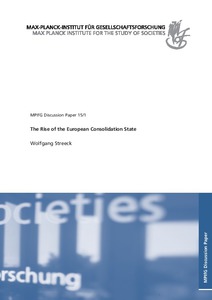The rise of the European consolidation state

Max-Planck-Institut für Gesellschaftsforschung, Köln
MPIfG - Köln
2015
26 p.
capitalism ; democracy ; economic recession ; public debt ; public finance
Discussion Paper
15/1
Public finance and taxation
English
Bibliogr.
"The rise of the consolidation state follows the displacement of the classical tax state, or Steuerstaat, by what I have called the debt state, a process that began in the 1980s in all rich capitalist democracies. Consolidation is the contemporary response to the "fiscal crisis of the state" envisaged as early as the late 1960s, when postwar growth had come to an end. Both the long-term increase in public debt and the current global attempts to bring it under control were intertwined with the "financialization" of advanced capitalism and its complex functions and dysfunctions. The ongoing shift towards a consolidation state involves a deep rebuilding of the political institutions of postwar democratic capitalism and its international order. This is the case in particular in Europe where consolidation coincides with an unprecedented increase in the scale of political rule under European Monetary Union and with the transformation of the latter into an asymmetric fiscal stabilization regime. The paper focuses on the developing structure of the new consolidation regime and its consequences for the relationship between capitalism and democracy."
Digital
The ETUI is co-funded by the European Union. Views and opinions expressed are however those of the author(s) only and do not necessarily reflect those of the European Union or the ETUI.